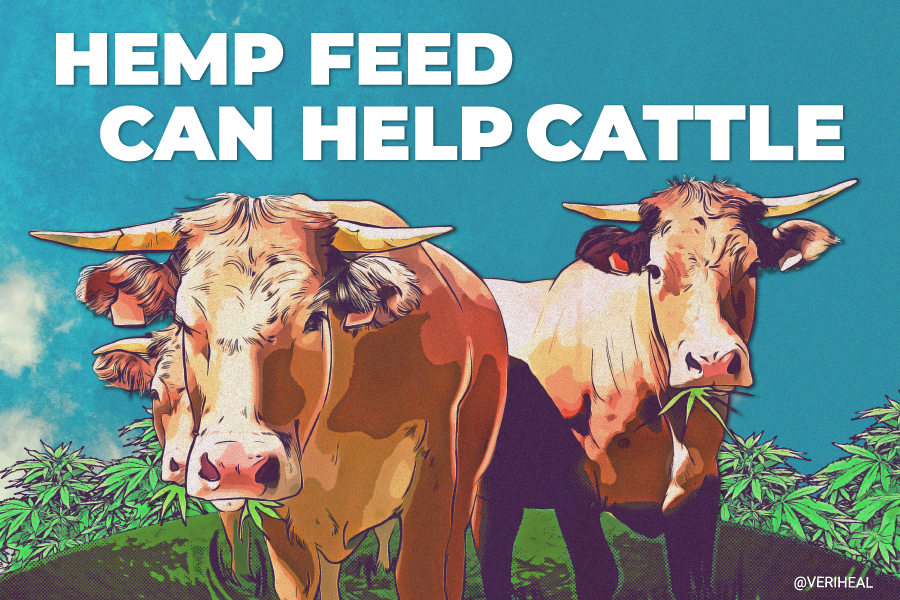Plenty of information exists on how cannabis can be beneficial for humans, but have you ever wondered what the benefits could be for cattle? Well, a research team from Kansas State University (K-State) investigated the potential benefits of feeding hemp to cattle. They found that hemp can have several benefits for their welfare when included in their diet.
Exploring CBD for Cattle
The researchers from K-State belong to the College of Veterinary Medicine, and they wanted to understand “how hemp can reduce stress and increase the times when cattle lie down.” Michael Kleinhenz, the assistant professor of beef production, explained:
“Cattle experience a variety of stress and inflammation. Our most recent data shows how cannabinoids via industrial hemp decreased the stress hormone cortisol as well as the inflammatory biomarker prostaglandin E2. This shows that hemp containing cannabidiolic acid, or CBDA, may decrease stress and inflammation in cattle. Thus, hemp may be a natural way to decrease stress and inflammation related to production practices such as transportation and weaning.”
According to Kleinhenz, this research can help them better understand how cannabis from industrial hemp interacts with bovine physiology and pharmacology. He stated, “For instance, we now know that repeated daily doses of CBDA via feeding hemp does not result in accumulation of cannabinoids in the blood…it solidified previous research and shows that each cannabinoid has its own absorption and elimination profile.” Additionally, this research also found that hemp can be used to increase lie-down time, “which helps them chew their cud and produce saliva.”
As with most research on cannabis and hemp, Kleinhenz explains that there is still a way to go in terms of research in order to get a better understanding of the potential biological effects on cattle that are exposed to repeated doses of hemp. He adds, “The initial data we have collected is essential should industrial hemp and its by-product be considered by the U.S. Food and Drug Administration (FDA) and the Association of American Feed Control Officials. Further work is needed to determine if cannabinoids can alter the stress response in cattle during stressful times such as transportation and weaning, but we hope this researcher is a step forward in the right direction.”
The study was federally funded and primarily found that short-term feeding of industrial hemp with high CBDA content “increases lying behavior and reduces biomarkers of stress and inflammation in Holstein steers (a breed of dairy cattle which contribute significantly to beef supply).” Industrial hemp, which was legalized via the 2018 Farm Bill, is defined as cannabis that contains less than 0.3% tetrahydrocannabinol (THC).
How the Study Worked
While this kind of research is considerably rare, it goes a long way toward helping to expand the understanding of the many diverse uses of cannabis—which could contribute to reasons for legalization. The study subjects included 16 male castrated Holstein cattle. The cattle were allocated into two different groups, one of which received the industrial hemp (the IH group) and one of which served as the control. This means that the researchers were able to compare the impact of hemp against a group that was exposed to the same environment and examinations but did not receive the hemp.
The researchers fed the IH group 25 grams of industrial hemp, which was mixed with 200 grams of grain once a day for 14 days in order to meet their target of 5.5 milligrams CBDA daily. The behavior of the groups was continuously monitored with accelerometers and blood samples, which were all collected at predetermined time points for plasma cannabinoid, serum cortisol, serum haptoglobin, liver enzymes, serum amyloid A, and prostaglandin E2 concentrations.
The IH group spent a mean of 14.1 hours a day lying compared to the 13.4 h/d of the control group. A study published in the Animals (Basel) journal explains that lying behavior is important for adult cattle and that it has been used “as a measure of cow comfort in numerous studies.” This study goes on to explain that when cattle are prevented from lying down, they display decreased plasma concentrations of growth hormones, elevated levels of plasma cortisol, and “other indicators of stress after just a few hours when prevented from lying down.”
The IH group also displayed an 8.8% reduction in prostaglandin E2 concentrations compared to the 10.2% increase in the control group. However, they found no differences between the groups in terms of haptoglobin or serum amyloid A. Simply put, the efforts of this study suggest that “feeding IH with a high CBDA content for 14 days increases lying behavior and decreases biomarkers of stress and inflammation in cattle.”
Feeding Hemp to Livestock
Marinda Louw of Field Crops South Africa explains that despite the lack of research, the benefits of hemp for cattle have been accepted by many. As an example, Louw explains that hemp leaves are fed to pigs and other livestock in rural China. She goes on to explain that industrial hemp can be processed into silage (grass or other green fodder compacted and stored in airtight conditions to be used as animal feed, particularly in winter) and that “the relative feeding value of hemp silage was found to be similar to lucerne (a nitrogen fixing legume which has a high nutritive value).”
Louw explains that hemp meal contains protein, iron, magnesium, manganese, high levels of dietary fiber, and essential amino acids. This also means that hemp meal can act as a protein substitute in the diet of pets and livestock. She adds that as of January 2019, hemp has been allowed in 40 U.S. states in order to study its feasibility as animal feed, but the U.S. Agricultural Improvement Act of 2018 does not address the use of hemp as a feed additive.
High levels of stress in cattle, especially when prolonged, can have long-term negative effects on the animals, including the likes of a weakened immune system, reduced reproduction, weight loss, digestive upsets, inflammatory reactions, and reduced feed consumption—all of which can result in unhappiness, unhealthiness, and vulnerability to disease, according to Pro Earth. Looking after the health of livestock is essential, and hemp can be a natural way and effective way to do just that.
Author, Share & Comments
















